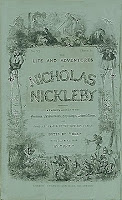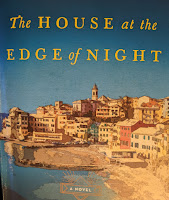When Nicholas Nickleby's father dies, Nicholas is left to care for his mother and sister in drastically reduced circumstances. They lose their home and most of what it contained, and though their paternal uncle Ralph has the means to help, he does not have that inclination. In fact he sets himself against them and does all he can to ensure their lives are as difficult and unhappy as possible.
Nicholas takes a job teaching in a boy's school run by the most obnoxious schoolmaster you'd ever want to meet. He and his family enjoy starving, beating and making the students miserable in as many ways as possible. Nicholas tries to help for a time, but when he can endure the injustices no longer, he leaves, unintentionally taking a student with him. Meanwhile, his sister, Kate, is forced into a thankless job and compromising situations by her cold-hearted Uncle, who begins to see his pretty neice as a possible advantage in his business interests.
Everyone is quite wretched for a time, but then, to the reader's reflief, Nicholas is hired by the Cheeryble brothers, who do much to help the family and bring justice to all the offenders.
There is far more to the story than this brief description and there are many more characters fleshing out this lengthy novel, but I'll let you discover them for yourselves. Suffice it to say that it's Dickens, so there'll be some you love and some you hate and you'll probably be happy with the outcomes of all.
The writing can get wordy and sometimes I wish he'd just get on with it, but then I come to lines like this and think again what a privilege it is to read his writing at all:
" The rules are a certain liberty adjoining the prison, and comprising some dozen streets in which debtors who can raise money to pay large fees, from which their creditors do NOT derive any benefit, are permitted to reside by the wise provision of the same enlightened laws which leave the debtor who can raise no money to starve in jail, without the food, clothing, lodging, or warmth, which are provided for felons convicted of the most atrocious crimes that can disgrace humanity. There are may pleasant fictions of the law in constant operation, but there is not one so pleasant or practically humouous as that which supposes every man to be of equal value in its impartial eye, and the benefits of all laws to be equally attainable by all men, without the smallest reference to the furniture of their pockets."
Dickens is disgusted by the injustice he sees in his society and he uses his novels to say so, clearly and with emphasis. I appreciate that aspect of his books, and the slightly more subtle way he skewers vanity and foolishness in his characters -
"Mrs. Squeers adjusted the bonnet and veil, which nothing but supernatural interference and an utter suspension of nature's laws could have reduced to any shape or form."
Well, maybe not so subtle, but perfectly worded, as are the following:
"...where sparking jewellery, silks and velvets of the richest colours, the most inviting delicacies, and most sumptuous articles of luxurious ornament, succeeded each other in rich and glittering profusion."
"...addicted to every depravity for which society can find some genteel name."
Reading Dickens is always enjoyable. The writing, the plot, and the characters all make this one well worth your time.










